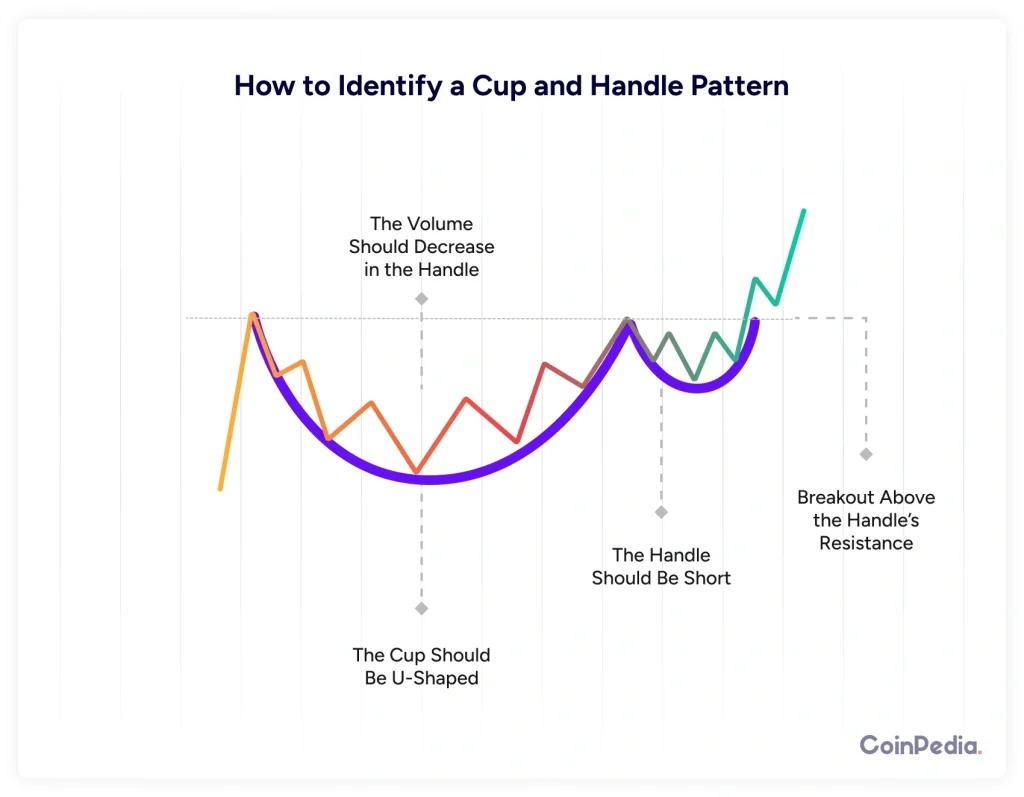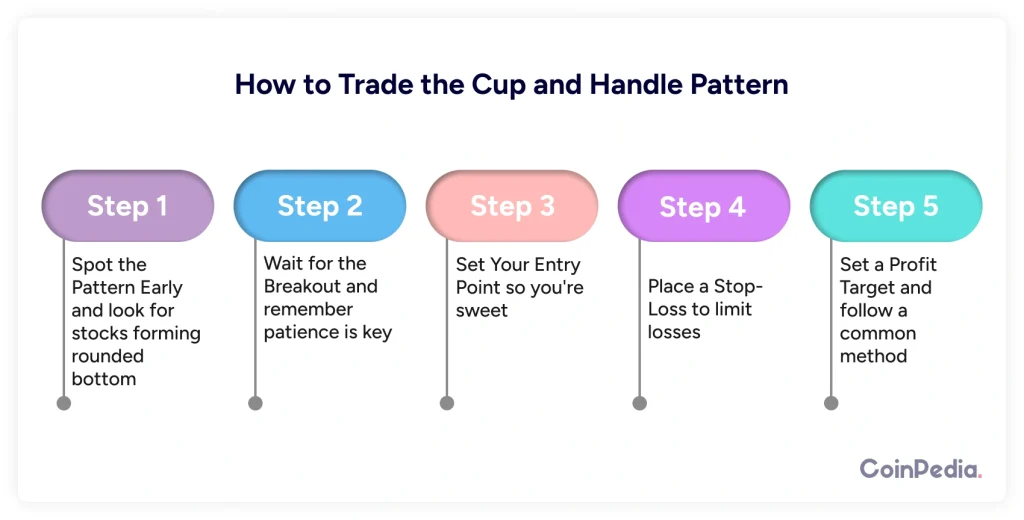
Have you ever noticed a stock price move in a way that looks like a teacup? It dips, flattens out, then rises again. That’s called the Cup and Handle pattern, and traders love it. Why? Because it’s a powerful signal that a stock might break out and go higher.
But spotting the pattern is just the beginning. You also need to know when to buy, where to set your stop loss, and how to maximize your profits. This guide will break it all down for you in a simple and conversational way. Let’s dive in!
What is the Cup and Handle Pattern?
Imagine you’re looking at a stock chart. The price moves down, levels out, and then starts climbing back up, forming a shape like a rounded cup. After reaching the previous high, the price takes a small dip again, forming the handle. This small dip, or pullback, is often the last shakeout before a strong breakout.
The pattern looks like this:
- Cup: A rounded bottom that forms after a decline in price.
- Handle: A small downward drift or sideways movement after the cup is complete.
- Breakout: A strong price move above the handle, leading to a rally.
This pattern tells traders that the stock is gaining strength. It first drops, then stabilizes, and finally gains momentum to break past resistance.
Why is it Important for Traders?
The Cup and Handle is a bullish continuation pattern. That means if it forms in an uptrend, there’s a good chance the stock will continue moving higher.
The key reasons traders love this pattern:
- It signals strong buying pressure – Institutions and big traders are accumulating shares.
- It offers clear entry and exit points – You know exactly when to buy and where to set your stop-loss.
- It has a high success rate – Historically, many stocks break out successfully from this pattern.
Sounds good, right? But before you jump in, let’s go step by step on how to trade it correctly.
How to Identify a Cup and Handle Pattern
Not every dip and rise in a stock chart is a Cup and Handle. Here’s how to spot a true pattern:
- The Cup Should Be U-Shaped – The cup should have a smooth, rounded bottom. A sharp V-shape is not ideal because it indicates sudden movements instead of a gradual buildup.
- The Handle Should Be Short – The handle usually forms in a slight downward direction or sideways. If it’s too deep, the pattern is less reliable.
- The Volume Should Decrease in the Handle – As the handle forms, volume should dry up. Then, when the breakout happens, volume should surge.
Breakout Above the Handle’s Resistance – The stock should break above the highest point of the handle with strong volume.

Example of a Cup and Handle Pattern
Let’s say a stock is trading at $100. Over time, it drops to $80, stabilizes, and climbs back up to $100. That forms the cup.
Next, instead of breaking out immediately, the price moves sideways between $95 and $100 for a few days, forming the handle.
Then, with high volume, the stock breaks above $100 and quickly moves to $110. This is the breakout traders look for.
How to Trade the Cup and Handle Pattern
Now that you can recognize the pattern, let’s talk about how to trade it.
Step 1: Spot the Pattern Early
Look for stocks forming a rounded bottom. Check if the price is approaching previous highs and slowing down to form a handle.
Step 2: Wait for the Breakout
Patience is key. Don’t buy too early. Wait for the stock to break above the handle’s resistance level with high volume.
Step 3: Set Your Entry Point
A good entry is slightly above the handle’s resistance. If the stock was struggling at $50, a buy order at $51 after a breakout would be smart.
Step 4: Place a Stop-Loss
Not every trade works out. Set a stop-loss slightly below the handle. If the handle bottom is at $47, placing a stop at $46 ensures you limit losses.
Step 5: Set a Profit Target
A common method is to measure the depth of the cup and project that amount upwards from the breakout point. If the cup depth is $10, add that to the breakout price. So, if the breakout happens at $50, the target would be $60.

Common Mistakes Traders Make
Even with a great pattern like this, traders can make mistakes. Here are some to avoid:
- Buying too early – Wait for the breakout, don’t jump in during the handle.
- Ignoring volume – Low volume on a breakout is a red flag. It might be a fake move.
- Setting a stop-loss too tight – Give the stock some room to breathe, or you might get stopped out too soon.
- Forgetting to take profits – Have a clear target and stick to it.
Cup and Handle in Crypto and Forex
While this pattern is common in stocks, it also works in crypto and forex trading. The same principles apply, but in crypto, the pattern may form faster due to volatility. In forex, it may appear on longer time frames like daily or weekly charts.
For example, Bitcoin often forms Cup and Handle patterns before major breakouts. If you spot one, it could signal a big move ahead.
Final Thoughts
The Cup and Handle is a simple yet powerful pattern that traders can use to spot breakouts. It helps you find stocks, cryptos, or forex pairs that are gearing up for a strong move.
To master it:
- Look for a smooth, rounded cup.
- Wait for a short handle.
- Enter on a strong breakout.
- Manage risk with stop-loss orders.
Now that you know how it works, start spotting these patterns on charts. The more you practice, the better you’ll get at catching profitable trades!
FAQs
The Cup and Handle is a bullish chart pattern where a rounded price drop (cup) is followed by a small dip (handle) before a breakout rally.
Enter when the price breaks above the handle’s resistance with high volume, set a stop-loss below the handle, and target profits based on cup depth.
Yes, it applies to crypto and forex, but crypto patterns form faster due to volatility, while forex patterns are more reliable on longer timeframes.
Historically, it has a high success rate, especially in uptrends, but traders should confirm with volume and avoid weak breakouts.
A valid breakout occurs when price moves above the handle’s resistance with strong volume, confirming buying pressure and trend continuation.
We'd Love to Hear Your Thoughts on This Article!
Was this writing helpful?
 Yes
Yes  No
No
Trust with CoinPedia:
CoinPedia has been delivering accurate and timely cryptocurrency and blockchain updates since 2017. All content is created by our expert panel of analysts and journalists, following strict Editorial Guidelines based on E-E-A-T (Experience, Expertise, Authoritativeness, Trustworthiness). Every article is fact-checked against reputable sources to ensure accuracy, transparency, and reliability. Our review policy guarantees unbiased evaluations when recommending exchanges, platforms, or tools. We strive to provide timely updates about everything crypto & blockchain, right from startups to industry majors.
Investment Disclaimer:
All opinions and insights shared represent the author's own views on current market conditions. Please do your own research before making investment decisions. Neither the writer nor the publication assumes responsibility for your financial choices.
Sponsored and Advertisements:
Sponsored content and affiliate links may appear on our site. Advertisements are marked clearly, and our editorial content remains entirely independent from our ad partners.




